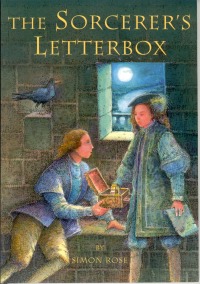| ________________
CM . . .
. Volume XI Number 2 . . . . September 17, 2004
excerpt:
Younger readers aged eight to eleven are in for a treat: Simon Rose's new book, The Sorcerer's Letterbox, is here! As with the best timeslip fantasy, the author's obvious zest for interesting historical detail is transformed into both a compelling story and an exciting adventure. Rose has admirably conquered the oft-lamented challenges of writing eloquently for younger readers. He has created a strong story crafted with simple, vivid language, where the occasional luminously sophisticated vocabulary word peeks out to show young readers what wonders await them when their reading levels improve. The adventure begins after a frightening dream awakens Jack. He glances at his antique wooden box, a family heirloom. The drawer that has always remained shut is now mysteriously open. Reading the letter inside propels Jack into the great adventure of trying to save King Edward V and his brother Richard, the Princes in the Tower, from certain doom. Jack travels back and forth from the present day to 1483, alternating between a safe yet unexciting existence at home and exciting yet dangerous adventures in the past. The well-paced storyline builds to a heady climax when Jack and his helpmate from the past, Meg, risk everything to save the princes. Almost more gratifying is the tidy resolution Rose provides for the princes, tying them into Jack's family tree; it feels satisfying for readers because it is so satisfying for Jack. Rose masterfully creates enough atmosphere of danger that is tantalizing but not frightening for his young readers. Similarly, enough fascinating historical details are sprinkled throughout to build a fully realized sense of fifteenth century life without overwhelming readers with textbook-like facts. Structurally, the novel is as pared down and simplified as a timeslip fantasy can be while remaining logical-- another plus for younger readers. Other textual elements also add appeal: a map, letters, tombstones and changing fonts all make the book seem magical. And the box itself, the timeslip talisman, is sure to delight readers of all ages. Not only is it beautiful, it's also magical and fascinating. Bombay Company watch out, there could soon be a flood of children looking for antique-looking painted wooden boxes! Having said that, there are a few of the awkward moments that are always associated with the genre. The sudden and mysterious appearance of the man with the bright blue eyes who teaches Jack to manipulate the box, perhaps the sorcerer himself, feels rather forced. The timeslip device itself, a wheel inside the box that turns to let Jack travel either backwards or forwards in time, is rather conveniently fickle: it suddenly sticks when Rose needs Jack to be stuck in the past, but miraculously turns not long after, making the author's manipulation seem heavy-handed. As always, the question of dialect looms large. Rose makes a valiant effort to include some sense of fifteenth century speech, but since The Sorcerer's Letterbox is aimed at younger readers, generally opts for plainer, relatively modern dialogue. The result is a mildly inconsistent. However, it is unlikely that Rose's younger readers would notice, let alone be bothered by such minor foibles. All in all, this is a delightful book, and one that has a rightful place in every library in the country. Highly Recommended. Michelle Warry is a graduate student in UBC's Master of Arts in Children's Literature program.
To comment
on this title or this review, send mail to cm@umanitoba.ca.
Copyright © the Manitoba Library Association. Reproduction for personal
use is permitted only if this copyright notice is maintained. Any
other reproduction is prohibited without permission.
NEXT REVIEW |TABLE OF CONTENTS FOR THIS ISSUE
- September 17, 2004.
AUTHORS
| TITLES | MEDIA REVIEWS
| PROFILES
| BACK ISSUES
| SEARCH | CMARCHIVE
| HOME |
